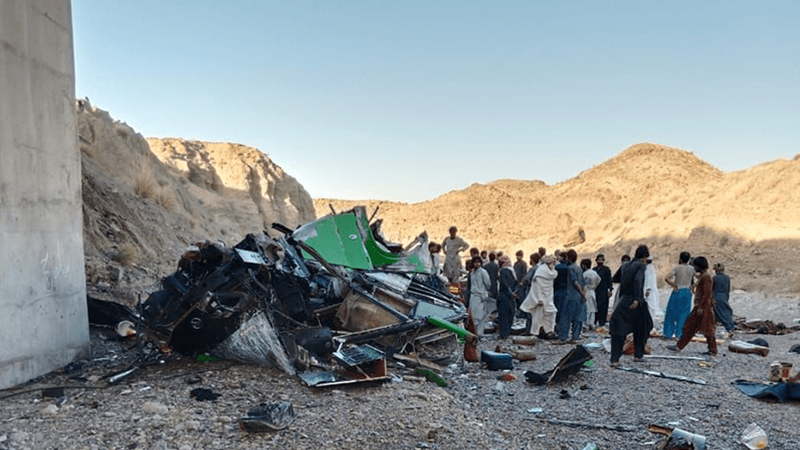At least 28 people have died and 20 others have been injured after a bus plunged into a ravine early Wednesday morning. According to Basima Assistant Commissioner (AC) Ismail Mengal, the tragic event occurred due to a tire burst, leading the vehicle to veer off the road and fall into the steep ravine.
The ill-fated bus was traveling from Turbat to Quetta during the night when the accident happened at approximately 4 AM. Among the deceased are women and children, adding to the profound sorrow of the incident. Some of the injured are reported to be in critical condition, with officials fearing that the death toll might increase.
Immediate aftermath and rescue efforts
The remoteness of the accident site, compounded by a lack of mobile network coverage and the absence of nearby settlements, resulted in a delay in rescue operations. Despite these challenges, Levies officials and rescue teams reached the scene as quickly as possible once the information was relayed to them.
The injured were swiftly transported to Basima Civil Hospital, where, tragically, 22 individuals succumbed to their injuries. The hospital staff are working tirelessly to provide medical care to the survivors, although the situation remains dire due to the critical nature of many injuries.
Official response and public mourning
Balochistan Chief Minister Mir Sarfraz Bugti expressed profound grief over the catastrophic loss of life. In his statement, CM Bugti extended his deepest condolences to the bereaved families and directed that all necessary medical facilities be provided to the injured. He also emphasised the need for a thorough investigation into the accident to prevent such tragedies in the future.
The human toll and community impact
The accident has sent shockwaves through the local communities, with many grieving the loss of friends and family members. The bus was carrying passengers from various walks of life, including women and children, highlighting the broad impact of the tragedy on the community.
In the wake of this disaster, the resilience and solidarity of the local population are evident as they come together to support the affected families. Community leaders and local authorities are coordinating efforts to provide aid and comfort to those in mourning.
A call for improved safety measures
This tragic incident underscores the urgent need for improved safety measures on Pakistan’s roads, particularly in remote and mountainous regions like Balochistan. Frequent accidents due to vehicle malfunctions, poor road conditions, and insufficient emergency response infrastructure continue to claim lives.
Advocates are calling for comprehensive safety audits and the implementation of stricter regulations for public transportation. There is also a pressing need for better-equipped emergency response teams and improved communication infrastructure to ensure timely assistance in case of accidents.
Preventing future tragedies
As the investigation into the causes of the Washuk bus accident proceeds, there is hope that the findings will lead to meaningful changes in transportation safety protocols. Ensuring regular maintenance checks, enforcing strict compliance with safety standards, and enhancing driver training programmes are essential steps to prevent similar tragedies.
Moreover, enhancing road infrastructure and ensuring that emergency services are better equipped and more accessible can significantly reduce the response time in critical situations, potentially saving lives.
